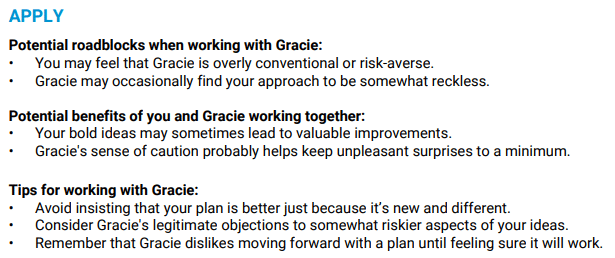Do opposite personalities attract? Do couples with similar personalities have fewer conflicts? We can’t answer these questions here because research results vary. But we are confident that marriages are improved through understanding, appreciation, and respect.
Many of us expect our spouse or our significant other to share our preferences for sociability, our way of behaving in the world, and even our fears. We judge each other based on our own preferences. We can be amazed, hurt, and even angered when we discover that our loved one’s desires and behaviors differ from our own. DiSC profiles can help couples better understand each other’s differences. This understanding can help us see that our partner’s priorities aren’t necessarily misplaced just because we don’t share them.
I used to be a minister and used DiSC as part of pre-marriage prep to help young couples understand each other better. Also used it with couples who were having issues for the same purpose.
Personality differences
Differences are normal and can enhance a relationship. Couples can discover more about themselves and about their partners after completing a DiSC assessment. The profiles provide nonjudgmental language they can adopt to describe themselves and their partner. Each person’s normal personality traits are shown in a positive light.
DiSC doesn’t hide away the challenges of different personalities; however, it does help put them in context. For example, one person’s natural inclination toward skepticism might play out with a partner’s statements being frequently challenged. This could easily be misinterpreted as attacking and dismissive. It could trigger a partner’s fears of disapproval. Together the couple can consider how these challenges might come from a need to analyze and understand, not to criticize. And the challenger can work with their partner to find ways to express more enthusiasm for the partner’s ideas before asking questions about them.
Marriages are enriched as couples further appreciate the complementary qualities of the other spouse. Understanding personality styles opens the door for greater levels of communication, encouragement, honor, acceptance, and intimacy.
The DiSC profiles can help couples rediscover the differences they once found attractive. A highly motivated person might have found someone who is more laid-back. Sometimes that drives them crazy and they label their partner as lazy. But other times they are reminded of the value of rest and recreation, and can be guided to that type of activity by the slower-paced partner. The outwardly more relaxed person might see their partner’s strong focus on goals as encroaching on their relationship. Together, with or without a counselor, the couple can review their profiles and talk about this difference and how they can each value and accommodate the other.
If a couple is considering marriage or a long-term commitment, their reports can highlight areas of difference and of possible conflict. They can strategize how to deal with issues before they come up.
Comparison Reports for couples

A very helpful tool for both the couple and the counselor is the Comparison Report. It is available once two people have taken the profile (see Everything DiSC Comparison Reports). It provides graphs like the one above. These are good places to begin a conversation. How are you currently experiencing this difference? How is it valuable in your relationship? What could reduce any conflict that arises from this difference?

Tips are also offered in this report. Couples can discuss if they think these tips might work for them or if they have even better ideas.
We should interject here that DiSC profiles cannot predict the likely success or failure of a marriage, determine the roles each partner should have within the marriage, or point out how to change or alter anyone’s behavior. But it can help you better understand your partner, appreciate your partner’s differences and contributions, recognize possible reasons for conflict, enable better communication, and affirm the normality of a range of behaviors.
I recommend using the Everything DiSC Workplace profile with the Comparison Report. Even though the assessment was created for business use, it’s very applicable to marriage. The profile’s focus on personality, what one finds stressful or motivating, and how to better connect with others is as helpful to relationships at home as it is to work relationships. View a sample Workplace profile and a Comparison Report to judge for yourself.
Another very useful profile is Everything DiSC Productive Conflict, which helps learners understand how to manage their responses to conflict situations. It also explores the destructive and productive conflict behaviors typical of each DiSC style. It can help those having difficulties with responding to conflicts.
Everyone here at Discprofiles.com has had their partner take the assessment and reviewed it with them. Even though my spouse and I share the same style, we still have conflicts. We found plenty in our profiles to discuss.

